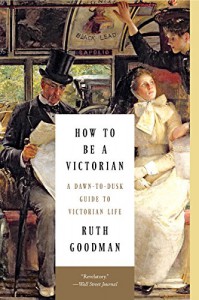SusannaG - Confessions of a Crazy Cat Lady
Just another GR refugee. Other than that, I had a stroke in 2004, and read almost anything I can get my hands on, though I have a particular weakness for history, mystery, and historical fiction.
Currently reading
How to be a Victorian

How to be a Victorian, like Ruth Goodman's How to be a Tudor, which I read in January, is a fine study of a foreign country - in this case the Britain of roughly 150 years ago.
It is filled with strange, often horrifying or amusing details. For example, that genteel ladies might want to take exercise, but were deathly afraid of being caught at it. (Their solution was to either take long walks, with a package under their arm, to suggest *really* being out on a charitable - and thus socially acceptable - errand, or to perform calisthenics, which would not disturb their movable wombs, in fashionable suits in the privacy of their own bedrooms.) That doctors were not against corsets, but only "tight lacing," which some particularly fashion-obsessed ladies used to reduce their waists to as little as 13 inches. That a large proportion of the population, most or some of the time, were hungry, and their nutrition was actually made worse by the rise of the Temperance movement. (The lure of the cities, even of their slums, was that you might eat better than poor in the countryside. Even if that "better" wasn't very good.)
It is also an excellent study of why regulations are a necessary part of society, for the protection of all of us. We want laws saying we can't be forced by our employers to work 12 or more hours a day. We want laws mandating safety equipment in factories. We want laws saying the makers of food and drugs can't lie in advertisements about what's in their products, and sell us watered chalk as milk, and opium as a safe and gentle herbal baby care treatment. We want laws preventing industrialists from hiring six-year-olds as coal miners. Because the Victorians had to fight for each and every one of those protections.
Let's not forget them, or their achievements.
















 16
16
 3
3